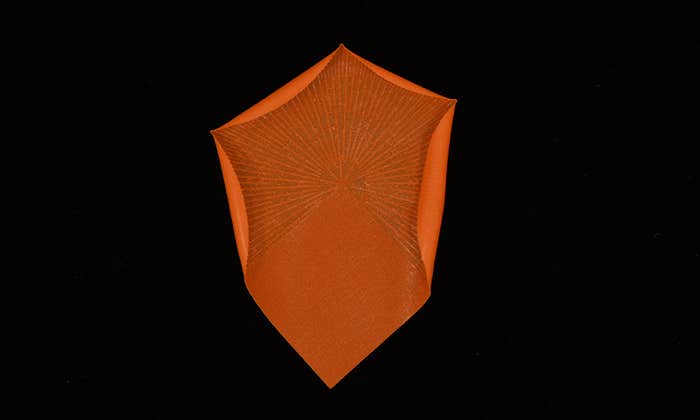If all science is either physics or stamp collecting, as Ernest Rutherford supposedly said, you get the impression that Fotini Markopoulou, 45, would find a way to make both endeavors equally fascinating. Five years ago, the acclaimed physicist decided to shift from the study of quantum gravity—one of the most theoretically and mathematically confounding challenges in modern science—to working as a product designer, grappling with business plans, accountants, and the minutiae of making things for everyday problems.
Markopoulou is now at the helm of a London-based start-up, Doppel, which will soon release its first product, a kind of watch that uses vibration to tweak your mental alertness and emotional state. She sees no contradiction between her diverse professional interests, and indeed, traces a thread of continuity between them. “Looking at the system while you are the system is something that I do find fascinating,” she says. As a theoretical physicist, her brief was to get to the bottom of the origins of space and time. As a designer, her mission is to understand the origins of human perception and experience.
My profile of Markopoulou, “This Physics Pioneer Walked Away from It All,” delves into Markopoulou’s life and career, from her childhood in Greece to her unconventional trajectory as a professional physicist. After spending several weeks together, Markopoulou and I sat down for a video interview.
Interview Transcript
How would you describe the key problem in quantum gravity?
The way that we understand the universe at its most fundamental level is through two main theories: quantum theory and general relativity. General relativity tells us about spacetime and quantum theory tells us about matter in spacetime. Now, there is an issue: Those two theories don’t play very well with each other.
The issue is that the way that they describe time is very different in [each] of them. Quantum theory never really bothers to think about time. Time is just something that the clock in your lab where you do your quantum experiment measures. In general relativity, however, time is essential; and how time flows and what it does depends on what everything else in the universe does.
Bringing these two theories together just generates a lot of problems. If you try to bring them together, you find out basically, the limitations of each of them. Quantum gravity needs to either find a very intelligent way to combine them, or in a way supersede them; and the key is always time. How do you put the time of general relativity, that reacts to everything that is going on, together with quantum mechanics?
How have you tried to solve the quantum gravity problem?
My particular approach in quantum gravity was possibly a little bit backward. Instead of attacking the problem of time, which seems to be the most crucial problem in quantum gravity, I attack the problem of space. What I’ve tried to do is keep time, as much as possible, like the time of quantum theory—but make space different. So in the theories that I’ve worked on, space does not exist. Space is something that emerges; it’s a derivative of everything else that goes on. There is stuff and time, and stuff happens in time. From the way the stuff behaves, you can infer what space looks like. Space fundamentally does not exist in my theories. Space is an emerging concept.
Why were you fascinated by quantum gravity?
Well, what I’ve always found really fascinating about quantum gravity is that it’s at the edge of what we know, and you’re pushing some of the deepest questions; they happen to be the hardest questions, unfortunately! You push them as far as they can go but at the same time, it is in the realm of science, and you’re bound by the rules of science so you’re not going to go off and do your own philosophy about the world. You’re going to stay with what can be checked, and what can be tested, and what experiments could possibly be done to make sure that what you’re talking about is relevant. This constraint, this boundary that being in physics brings, makes working in these deep questions a lot more satisfying—also a lot harder.
Why did you leave physics?
It is difficult to say why. I think a lot of things led to that decision. One of them is that I’ve always liked a lot of different things, and doing one thing with the intensity that I was doing quantum gravity before was wonderful; but at the same time, there’s so much else. I felt this need to try more things. Also, there is a balance in my own life—or who I am—in going from quantum gravity, which is very abstract and something that is very much in your mind, and theories that you can communicate with a very small number of people to design—possibly the most ubiquitous thing that humans do. It’s a very human thing. We make things. We envision things. It’s about how we understand our lives, what we want from our lives. It’s something that is very human, very common, very much made by your hands—not with your mind. At this point in my life, it’s what makes me happy.
What are you working on now?
I’m now working on Doppel. Doppel is this—a wearable technology, a wristband that makes you calm and focused or more energized on demand. Doppel is an interesting story. It came out of research that we did at the Royal College of Art and Imperial College. What we were doing was looking into psycho-physiology, which is the area in neuroscience and psychology that looks at the physiological underpinning of psychological processes to understand how our emotions affect how we think and feel and behave.
Essentially what Doppel does, the easiest way to explain it, is [that] it’s a bit like music. So when you want to get going you will put on fast music and that gets you going; and when you want to relax you put on calm music, and that is soothing. What’s going on there is that your body viscerally responds to rhythm. We don’t just perceive rhythm, we entrain to it. Doppel essentially harnesses this effect, except in Doppel, it’s a rhythm that you feel. What Doppel does is it has a heartbeat, and you feel it on the inside of your wrist where you normally feel your pulse. If you set it at your resting heart rate, this is calm and focusing. If you put it at a higher rate, depending on what you prefer, that gets you going.
Are there similarities between what you were doing in physics and what you are doing now in wearable technology?
I guess there are some similarities between what I do now and what I did before—although sometimes it’s difficult to tell what this may be. There is of course the obvious thing that Doppel in a way, plays with your perception of time. When you perceive a rhythm, you perceive time; but let’s go away from this obvious analogy, which I don’t think is the most interesting thing.
I think more interesting for me is trying to understand a system when you’re in it. The problem of quantum gravity is that we’re trying to understand the universe, but we are in the universe, which makes it difficult to combine what we see with the usual description in physics, which is from an outsider’s perspective looking at what you’re studying. Psycho-physiology and Doppel, and even wearable technology have some similarities: You are trying to understand being human and perception, but you are human and you’re perceiving while you try to understand what’s going on. Looking at the system while you are the system is something that I do find fascinating.
What do young women ask you about a career in science?
It used to be that the question was, are there any women in science? And obviously, there are. The question for girls now is, are the women in science happy? Are they normal? Are they the women I want to be when I grow up? When I’ve given public lectures, or when I’ve had a chance to interact with say, high school girls, what they would often come up to me and mention afterward—they like the talk, they really love quantum gravity and what we are working on—but often they would say things like, oh you are wearing a dress; that’s kind of a big deal. Because, I think what they have in mind is a strange kind of woman in science. So communicating that it’s just normal women leading happy lives seemed to be what they’re really asking.
What sparked your interest in physics?
I’ve noticed with a lot of my colleagues in quantum gravity, if you ask them what got you into quantum gravity, they almost all have a story of a book about Einstein. They read what Einstein did and then they decided that they’re going to do more. I don’t have that story. I never really particularly read a book about Einstein. I never particularly found Einstein such an appealing figure to start with. That’s me. I actually liked a lot of different things when I was growing up and science was not an obvious choice. I can remember … You know, in Greek churches, the ceiling has these beautiful stars, like cosmology really, painted on the ceiling. I always found it very fascinating, and my mom would complain that I could sit there for hours and just look at that ceiling. I guess the basic question was there for a long time. I can’t easily point to something that—click!—I wanted to be a physicist. It was a slow process and it was several decisions [and] I made some of them a little bit by accident!
So you got into physics by accident?
If you really want to press me on when I decided to become a physicist, I have an almost embarrassing story of walking through the wrong door. I was in Athens and I was 17 and I still didn’t really know what I wanted to do, because I really wanted to be an astronaut. But, I also wanted to be an archaeologist and lots of other things!
The Greek educational system is not very good, so they didn’t teach us properly at school. What you were supposed to do is go and sign up for evening classes to learn what I should have taught here at school, but I didn’t. I went to the center of Athens, which is where all these evening schools are, to find what I should sign up for and went through the wrong door and ended up in this place where they did A levels, to prepare you to go to England to start attending the university there. I didn’t know what A levels were, and I never thought about going to England. But, I ended up in this long conversation with a guy from the school, at the end of which, I had signed up for the theoretical physics in England.
Is it possible to solve quantum gravity in our lifetime?
I remember when I was doing my Ph.D., my Ph.D. supervisor Chris Isham, he said, “It’s going to be 200 years before anybody makes any progress in this problem.” [Then I thought], he must be wrong! I’m not completely sure anymore. I have occasionally wondered what it would be like if somebody solves it in my lifetime because it’s going to be a little disappointing if I’ve left and somebody solves it. I don’t think so, but you never know. At the same time, I’d love to see the answer. I’m kind of torn.



























